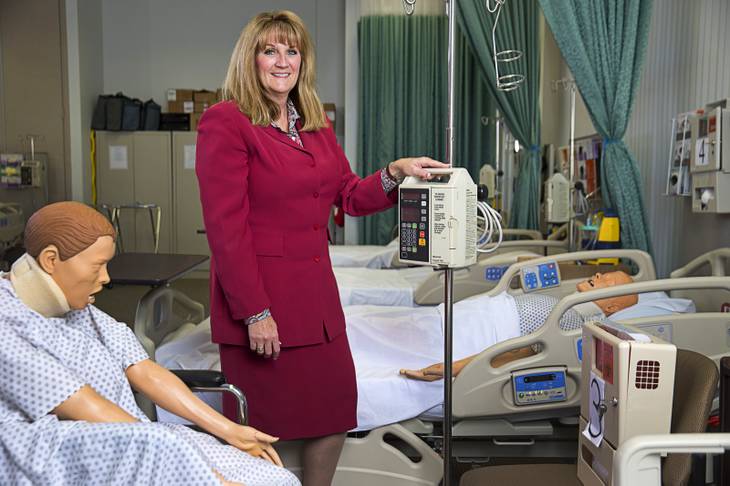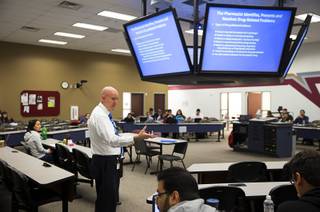Health care in Southern Nevada continues to make strides.
The latest is among the most far-reaching: Roseman University of Health Sciences is responding to a pressing need by developing a doctor of medicine degree program.
Roseman, which was established in 1999 as a pharmacy school but expanded into academic programs in dentistry,
nursing and business administration, launched its College of Medicine in 2013 and recently received an accreditation visit for its doctor of medicine program. If everything goes as hoped, the institution will receive its accreditation in June and stay on course to enroll its first class of M.D. students in the fall of 2017. That’s the same target date set by UNLV’s new School of Medicine, which was established with $27 million in state funding approved by lawmakers in June 2015.
As with UNLV, Roseman’s goal is to help reduce a statewide physician shortage in practically every discipline.
“In comparison to the national average of number of physicians per 100,000 population, in Clark County we need over 2,000 physicians just to be average,” said Dr. Mark Penn, founding dean of the Roseman College of Medicine and chancellor of the university’s Summerlin campus. “Our College of Medicine will help meet this need.”
Penn said Roseman would take steps before, during and after the medical school opens, developing “pipeline programs before students are admitted to medical school, creating a medical school curriculum that is embedded in our neighborhoods, and helping our hospitals develop more opportunities for graduate medical education.”
Doctors tend not to move far from the state in which they did their training, Penn said. To him and his colleagues, increasing the number of physicians through the medical schools is important, but so is developing residency programs.
Renee Coffman, president and co-founder of Roseman, said the curriculum was crafted with input from the community to “produce the doctors that best meet the unique needs of Southern Nevada.”
It’s an approach Roseman has taken since its establishment, when it was called the Nevada College of Pharmacy.
ROSEMAN’S BEGINNINGS
“In the 1990s, like many areas of health care, Nevada was suffering from a severe shortage of pharmacists,” Coffman said. “At the time, Nevada had no pharmacy school.”
Since enrolling its first class of doctor of pharmacy students in 2001, Coffman said, the university “has listened to the needs of the community, including our partners in health care, and developed new programs to fill those needs.”
An example is the establishment of its College of Nursing in 2006.
Roseman created an 18-month bachelor of science in nursing degree program and a 16-month accelerated bachelor of science in nursing program. The accelerated program features a hybrid on-site/online structure designed to accommodate people wishing to make a career change.
This year, Roseman added a nine-month program for registered nurses to receive a bachelor of science degree in nursing and a special program for veterans returning from military duty, Coffman said.
The Veteran’s BSN program is supported by a $1 million federal grant and provides support and services to veterans wishing to pursue nursing careers. Together, these programs are graduating nurses ready to be employed at area hospitals.
“By listening to community partners, examining health care deficiencies and thoughtfully planning and executing the creation of new programs, the university has been able to address some of Southern Nevada’s greatest health care needs,” Penn said.
It is this responsiveness that prompted Roseman to begin assessing the need for a medical school about six years ago.
“In 2011, we assembled a committee that consisted of external community leaders and experts, as well as internal staff to conduct a feasibility study to determine community need and university readiness,” Coffman said.
That study led to Roseman University’s board of trustees approving the College of Medicine in fall 2013, and soon after hiring Penn as founding dean. The college, a community-based program, is housed at Roseman’s Summerlin Campus, which includes the 184,000-square-foot Ralph & Betty Engelstad Research Building and an adjacent 143,000-square-foot building that includes office and clinical facilities.
The College of Medicine has 40 faculty members and staff, so far.
HIGH EXPECTATIONS
Roseman’s approach to education, Penn says, is anchored in several core principles: high expectations for student achievement, the adoption of active learning approaches that result in deep learning and content mastery, early exposure to the profession and an emphasis on collaboration in learning and practice.
“This model has proven its effectiveness with consistently positive outcomes on licensure examinations and career placements for graduates in pharmacy, nursing and dentistry,” Penn said.
Roseman has made research and scholarly activity a core mission — and a major component of its strategic plan. The university hired several researchers after the closure of Nevada Cancer Institute in February 2013. Now part of the College of Medicine, their focus is on cancer, diabetes and obesity, as well as Alzheimer’s and Parkinson’s diseases.
“We are fortunate to have exceptional research facilities at the Summerlin Campus ... that will help us grow and sustain medical research in the college and for the university’s other programs,” Penn said.
Coffman said she and her colleagues had fielded questions about Roseman’s education model from other institutions — “typically from schools and organizations that embrace innovation and appreciate looking at best practices broadly so as to create a curriculum that is effective for students with varied learning styles.”
Several institutions — pharmacy schools, in particular — have adopted all or parts of Roseman’s educational approach, she said.
Ultimately, Coffman says, every program Roseman develops is based on community, state and regional health care needs.
“As a nonprofit, private institution that is not supported by taxpayer dollars, we are very thoughtful when starting new programs, and a demonstrated need is the first thing we consider,” she said.
The university’s size and structure also have allowed it to stay nimble.
“Listening, acting and cutting through perceived obstacles, as well as the lack of a cumbersome bureaucracy, have allowed us to quickly respond and act on behalf of our community’s needs,” Coffman said.

